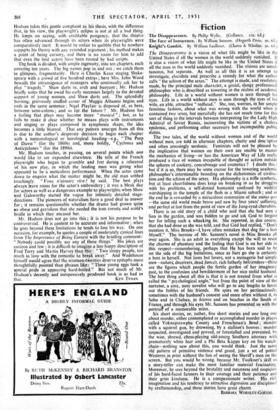Fiction
The Disappearance. By Philip Wylie. (Gollancz. t2s. 6d.)
The Disappearance is a vision of what life might be like in the United States if all the women in the world suddenly vanished. It
is also a vision of what life might be like in the United States if all the men in the world suddenly vanished. The visions are simul- taneous, but separate. As well as all 'this it is an attempt to investigate, elucidate and prescribe a remedy for what the author calls " the schism of the sexes." The attempt is made, and resolutely made, by the principal male character, a genial, slangy professional philosopher who is described as towering in the realms of academic philosophy. Life in a world without women is seen through his eyes. Life in a world without men is seen through the eyes of his wife, an able, attractive " redhead." She, too, worries, in her simple feminine fashion, about what was wrong with the world when it contained two sexes, but mercifully she has not much time for this sort of thing in the intervals between interpreting for the Lady High Admiral of Soviet Russia, incinerating the victims of a cholera epidemic, and performing other necessary but incompatible public duties.
The two tales, of the world without women and of the world without' men, are told in alternate chapters, chatty and desc iptive and often amusingly sardonic. Feminists will not be pleased by the implication that women on their own are unable to master the mechanics of living—or has the American Way of Life really produced a race of women incapable of thought or action outside the spheres of cookery, concubinage and cosmetics ? I doubt this ; but if it is so, there may be some excuse for the towering academic philosopher's interminable brooding on the dichotomies of civilisa- tion and the schism of the sexes. His philosophy is a trifle synthetic,' but at least cheerfulness does keep on breaking in as he strugg'es with his problems, a self-denied humanist confused by wishful worshipping in the temple of the flesh in a Miami suburb ; and in the end he is rewarded by a miraculous restoration of the status quo —the same old world made brave and new by four years' suffering,
• and perfect at last from the point of view of the Jung-eyed cherubins.
There is an old story of a child who said that she had seen a lion in the garden, and was bidden to go and ask God to forgive her for telling such a whacking lie. She reported, in due course, that she had done as she was told, and that God had replied, "Don't mention it, Miss Brooks—L have often mistaken that dog for a lion Myself." The heroine of Mr. Sansom's novel is Miss Brooks all over again. She is an adult in everything except the will to resist the charms of phantasy and the feeling that God is on her side in this respect—remembering, perhaps that He has been said to be on the side of the big battalions, since as liars- go she is certainly a host in herself. Not lions but lovers, not a menagerie but simply men—suitors, deceivers, dead fiancés, rich fatherly befrienders—these are the figures which people the fertile garden of her imaginary past, to the confusion and bewilderment of her nice stolid husband. The best thing about all this is that it is not treated from what is called the " psychological angle," but from the point of view of the narrator, a cosy, nosy novelist who will go to any lengths to ferret out the foibles of his friends. He spies on her pertinaciously. sometimes with the husband's consent and more often without it, in Soho and in Chelsea, in bistros and on beaches in the South of France and through his eyes Mr. Sansom has presented us with the
rt poraif of a memorable minx.
Six short stories, or, rather, five short stories and one long one about murder, either contemplated or accomplished murder in places called Yoknapatawpha County and Frenchman's Bend ; murder with a squirrel gun, by drowning, by a stallion's hooves ; murder suspected, investigated and proved, or forestalled and prevented, by the wise, shrewd, chess-playing old-young Southern attorney with, prematurely white hair and a Phi Beta Kappa key on his watch- chain—nothing new about this, you would think. Just the same old pattern of primitive violence and greed, just a set of potted Westerns in print without the fun of seeing the Sheriff's men on the screen. But you would be wrong, because Mr. Faulkner's skill as a story-teller can make the most familiar material fascinating. Moreover, he sees beyond the brutality and meanness and suspicion of his hard-faced farmers to their courage and their patience and their grim kindness. He is a compassionate writer. His rich imagination and his tendency to attractive digression are disciplined by craftsmanship,.and these stories have great charm.
BARBARA WORSLEY-GOUGH.


































 Previous page
Previous page